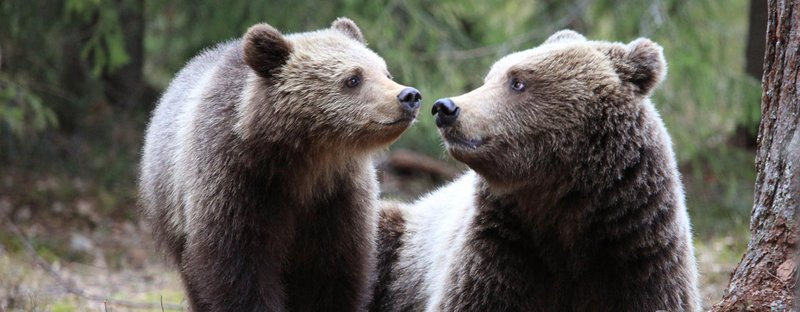Snacks, back rubs, and long winter naps: These are a bear’s necessities
Updated | By Beautiful News
The brown bear is the largest predator in Europe.

The sun’s rays crack over the snow-capped mountains. Leaves rustle with the wind, dancing along in the cool, crisp air. Down by a stream, a mammoth brown bear catches a rogue salmon mid air, piercing it with its jaws. With their unmatched strength and grandeur, these remarkable creatures command admiration. It’s no wonder Finland named them their national animal.
Brown bears are found in the Taiga, or boreal forest, a biome distinguished by pine trees and evergreen foliage. This ecosystem, found in Europe, North America, and Asia, is subject to extensive winters. It’s the perfect home for these fluffy creatures, who comb out dens in the forest hillsides. Having adapted to the chilly environment, their burrows and thick coats provide the warmth they need for their months-long hibernation.
Babies are born just after this dormant period. While bears are largely solitary creatures, mothers will care for their cubs for two or three years after birth. With diets similar to our own, they snack on berries, nuts, fruit, and fish. These creatures consume up to 40 kilograms of food a day. Normally weighing over 300 kilograms, they can pack on over twice that amount when winter lays down the first snows.
These feasts have another significant purpose – they fuel their thriving ecosystem. Bears can trek up to 80 kilometres a day through the forest. While they meander around the woodland, their droppings are widely spread, enriching the soil with nutrients. Yet they don’t always travel on all fours. Bears occasionally spring up onto their hind legs, using their front paws to pick up tasty morsels. This position also allows them to spread their scent on trees, marking their availability for breeding while relishing in a little back rub.
But despite being at the top of the food chain, brown bears still face threats. They’re hunted as big game as well as for their hide, and their gall bladders fetch high prices in Asia. While their population is still stable, we must do all we can to prevent a decline. Brown bears deserve all the respect they can get.
For more Beautiful News stories see below:
- This midwife is delivering a first for moms in impoverished communities
- Fear doesn’t stand a chance when love has the final say
- Wrongfully convicted. Jailed for 19 years. He’s now free and fighting injustice
- This couple’s enchanting garden sprouts support for healthcare workers
- How free online violin lessons are orchestrating hope in townships
Images by Valtteri Mulkahainen were used in the creation of this film
In the face of the COVID-19 crisis, you can help us spread information and hope. Share your positive stories by clicking here and we’ll be in contact.
Show's Stories
-
R20,000 Cognac order: The wildest food deliveries
From a whole lot of fried chicken to expensive cognac, here are some of ...
Stacey & J Sbu 4 hours ago -
Update: Rocky the seal is one strong pup!
Do you remember the adorable seal who washed up on Rocky Bay Beach last ...
Stacey & J Sbu 4 hours ago